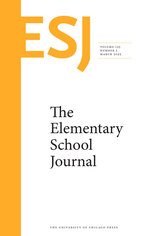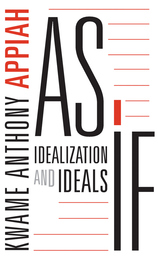
“Appiah is a writer and thinker of remarkable range… [He] has packed into this short book an impressive amount of original reflection… A rich and illuminating book.”
—Thomas Nagel, New York Review of Books
Idealization is a fundamental feature of human thought. We build simplified models to make sense of the world, and life is a constant adjustment between the models we make and the realities we encounter. Our beliefs, desires, and sense of justice are bound up with these ideals, and we proceed “as if” our representations were true, while knowing they are not. In this elegant and original meditation, Kwame Anthony Appiah suggests that this instinct to idealize is not dangerous or distracting so much as it is necessary. As If explores how strategic untruth plays a critical role in far-flung areas of inquiry: decision theory, psychology, natural science, and political philosophy. A polymath who writes with mainstream clarity, Appiah defends the centrality of the imagination not just in the arts but in science, morality, and everyday life.
“Appiah is the rare public intellectual who is also a first-rate analytic philosopher, and the characteristic virtues associated with each of these identities are very much in evidence throughout the book.”
—Thomas Kelly, Notre Dame Philosophical Reviews
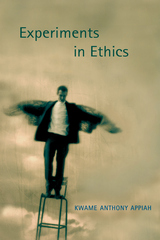
In the past few decades, scientists of human nature—including experimental and cognitive psychologists, neuroscientists, evolutionary theorists, and behavioral economists—have explored the way we arrive at moral judgments. They have called into question commonplaces about character and offered troubling explanations for various moral intuitions. Research like this may help explain what, in fact, we do and feel. But can it tell us what we ought to do or feel? In Experiments in Ethics, the philosopher Kwame Anthony Appiah explores how the new empirical moral psychology relates to the age-old project of philosophical ethics.
Some moral theorists hold that the realm of morality must be autonomous of the sciences; others maintain that science undermines the authority of moral reasons. Appiah elaborates a vision of naturalism that resists both temptations. He traces an intellectual genealogy of the burgeoning discipline of "experimental philosophy," provides a balanced, lucid account of the work being done in this controversial and increasingly influential field, and offers a fresh way of thinking about ethics in the classical tradition.
Appiah urges that the relation between empirical research and morality, now so often antagonistic, should be seen in terms of dialogue, not contest. And he shows how experimental philosophy, far from being something new, is actually as old as philosophy itself. Beyond illuminating debates about the connection between psychology and ethics, intuition and theory, his book helps us to rethink the very nature of the philosophical enterprise.
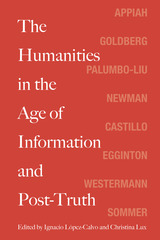
While the reader may suspect that these types of lucubration are a desperate reaction to decreased public funding for the humanities worldwide, a decreased enrollment of students, or anxiety over the future of our profession, there is in this volume a coherent argument for the continued need, perhaps more now than ever, to invest in humanities education if we are to have informed and socially conscious citizens rather than just willing consumers and obedient workers. Furthermore, the essays prove that the humanities and the arts are, after all, not a luxury but an integral part of a complete scholarly education.
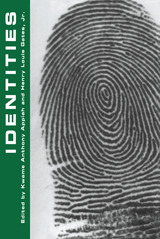
Leading scholars in literary criticism, anthropology, sociology, and philosophy explore such topics as "Gypsies" in the Western imagination, the mobilization of the West in Chinese television, the lesbian identity and the woman's gaze in fashion photography, and the regulation of black women's bodies in early 20th-century urban areas. This collection of twenty articles brings together the special issue of Critical Inquiry entitled "Identities" (Summer 1992), two other previously published essays, and five previously published critical responses and rejoinders, all of which is interrogated in two new essays by Michael Gorra and Judith Butler.
Contributors include Elizabeth Abel, Kwame Anthony Appiah, Akeel Bilgrami, Daniel Boyarin, Jonathan Boyarin, Judith Butler, Hazel V. Carby, Xiaomei Chen, Diana Fuss, Henry Louis Gates, Jr., Avery Gordon, Michael Gorra, Cheryl Herr, Saree S. Makdisi, Walter Benn Michaels, Christopher Newfield, Gananath Obeyesekere, Molly Anne Rothenberg, Gayatri Chakravorty Spivak, Sara Suleri, Katie Trumpener, and Joseph Valente.
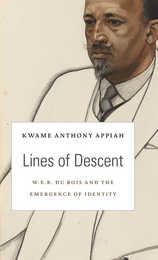
W. E. B. Du Bois never felt so at home as when he was a student at the University of Berlin. But Du Bois was also American to his core, scarred but not crippled by the racial humiliations of his homeland. In Lines of Descent, Kwame Anthony Appiah traces the twin lineages of Du Bois’ American experience and German apprenticeship, showing how they shaped the great African-American scholar’s ideas of race and social identity.
At Harvard, Du Bois studied with such luminaries as William James and George Santayana, scholars whose contributions were largely intellectual. But arriving in Berlin in 1892, Du Bois came under the tutelage of academics who were also public men. The economist Adolf Wagner had been an advisor to Otto von Bismarck. Heinrich von Treitschke, the historian, served in the Reichstag, and the economist Gustav von Schmoller was a member of the Prussian state council. These scholars united the rigorous study of history with political activism and represented a model of real-world engagement that would strongly influence Du Bois in the years to come.
With its romantic notions of human brotherhood and self-realization, German culture held a potent allure for Du Bois. Germany, he said, was the first place white people had treated him as an equal. But the prevalence of anti-Semitism allowed Du Bois no illusions that the Kaiserreich was free of racism. His challenge, says Appiah, was to take the best of German intellectual life without its parochialism—to steal the fire without getting burned.

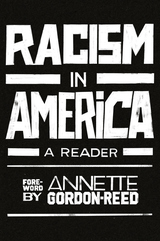
Racism in America has been the subject of serious scholarship for decades. At Harvard University Press, we’ve had the honor of publishing some of the most influential books on the subject. The excerpts in this volume—culled from works of history, law, sociology, medicine, economics, critical theory, philosophy, art, and literature—are an invitation to understand anti-Black racism through the eyes of our most incisive commentators.
Readers will find such classic selections as Toni Morrison’s description of the Africanist presence in the White American literary imagination, Walter Johnson’s depiction of the nation’s largest slave market, and Stuart Hall’s theorization of the relationship between race and nationhood. More recent voices include Khalil Gibran Muhammad on the pernicious myth of Black criminality, Elizabeth Hinton on the link between mass incarceration and 1960s social welfare programs, Anthony Abraham Jack on how elite institutions continue to fail first-generation college students, Mehrsa Baradaran on the racial wealth gap, Nicole Fleetwood on carceral art, and Joshua Bennett on the anti-Black bias implicit in how we talk about animals and the environment.
Because the experiences of non-White people are integral to the history of racism and often bound up in the story of Black Americans, we have included writers who focus on the struggles of Native Americans, Latinos, and Asians as well. Racism in America is for all curious readers, teachers, and students who wish to discover for themselves the complex and rewarding intellectual work that has sustained our national conversation on race and will continue to guide us in future years.
READERS
Browse our collection.
PUBLISHERS
See BiblioVault's publisher services.
STUDENT SERVICES
Files for college accessibility offices.
UChicago Accessibility Resources
home | accessibility | search | about | contact us
BiblioVault ® 2001 - 2025
The University of Chicago Press




